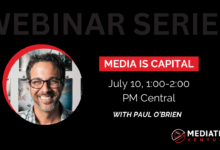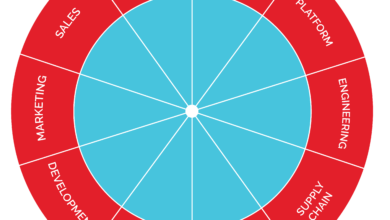Economic Downs are Entrepreneurs’ Up

“Right now, the markets are looking downright scary. For startups, the funding outlook is bleak as VC’s pull back funding. This is leading to spending cuts, layoffs, and even causing some startups to fold!”
Mark Birch, one of my favorite people in the startup ecosystem, shared that thought last week amidst the cryptocurrency collapse, fall on Wall Street, and increasing concerns about affordability in the United States. He’s the Global Advocate for Startups at AWS, and so assuredly he is among the few who see the impact of the economy on founders. Given the work that people such as ourselves do, the impact is not only firsthand knowledge, but we also see how entrepreneurs see challenges as opportunities and in moments like this, we see who and how startups are likely to lead us out of a downturn and back into a boom.
Mark added, “Not all is negative though. Early stage funding is still robust even if valuations are lower. More importantly, founders are becoming more disciplined about the economics of their business model and how they get to product market fit.”
While the market signaled tough times ahead, and soothsaying influencers jumped on social media to cry, “hold on to your seat,” Elsewhere Partners, here in my Austin, TX backyard, closed a $175M fund, with Partner Chris Pacitti sharing with Austin Inno, “Investing, both our capital and our network, in companies that don’t always get the attention they deserve from the startup funding ecosystem at large, we’ve been able to make deeper connections and partner with founders on the path toward a meaningful exit.”
Optimism, and a more connected and collaborative methodology toward what takes the economy into a new era, innovation: “companies that don’t always get the attention they deserve.”
NOW is a Good Time to Startup
How everyone can help?
- Access to Opportunity by reducing barriers to entry
- Access to Funding with holistic, accessible, and innovative approaches to capital
- Access to Knowledge through real world experienced workforce development and startups
- Access to Support so that everyone can take the risks involved in starting
That, the vision in values in Start Us Up, Four Pillars of entrepreneur-focused economic development organized in a Business Plan for the economy, that a consortium of organizations, including MediaTech Ventures, helped drive and release, just today for 2022.
The timing of the release of that Plan could not be more appropriate, as it signals to policy makers and investors while dissension sows, that THIS is how we accelerate recovery of economies. That, if we work together, as Chris Pacitti noted (network companies, deep connections, and partner with founders), we’re creating opportunity, supporting the risk takers, and providing knowledge, and if we keep funding the innovations, Entrepreneurs will turn tough times into new companies, jobs, and solutions.

Entrepreneurs think differently and that’s evident in appreciating in what started during a recession
- General Electric. Launched: 1892.
- General Motors. Launched: 1908
- IBM. Launched: 1911.
- Disney. Launched: 1929.
- HP. Launched: 1939.
- Hyatt. Launched: 1957.
- Trader Joe’s. Launched: 1958.
- FedEx. Launched: 1971.
Not a bad crowd in which to find yourselves, no? Need a more modern list in order to appreciate my point? Microsoft, Intel, Southwest Airlines, MTV (Music Television), CNN, Airbnb, Bitly, and Groove Networks. Apple was founded in 1976/1977, right as we were emerging from a recession (meaning we all know Steve Jobs and Steve Wozniak were working together thanks to that recession, to uncover a way forward better).
It’s easy to conclude that what’s best is starting a company when times are good.
- Capital and consumer spending seem more accessible
- And in good times you probably have a job and sense of security; you can take some risk
But a booming economy also means…
- Labor is more expensive
- People is more competitive and fluid (likely leave you)
- Capital is more expensive, so while it seems it’s there, interest rates on loans and terms from investors favor them
- That job and sense of security you have is actually a safety net which diminishes ambition, work ethic, and even desperation (motivation)
- Consumers might be spending more but they’re spending more with your competition
- And in a healthy market, there is actually less attention on innovation because it seems like there are fewer problems to overcome
A recession reminds us that we need startups and innovation, that we need new businesses, that we must take risks on entrepreneurs. This is precisely the time when great companies are built, and incredible startups are founded.
Great companies are a result of a mission and vision, a commitment and passion to that mission and vision, and teams, people, working together to innovate new solutions for the market.
- Capital and consumer spending tends to be down (but you’re just starting so, so what?) and in spending people are more discerning about value and better solutions.
- You likely don’t have a job now or question your job security (so start something!)
- Labor is less expensive (making it more likely to find cofounders)
- Labor is less fluid because alternatives aren’t hiring (meaning a team is more likely to stick with you)
- Capital is LESS expensive so while it may not seem to be there (it is), investors tend to be more flexible because they want to help
- Any job and sense of security you (and other founders) have is cast into doubt motivating people to create that safety nets of their own
Economic Downs are Entrepreneurs’ Up
“Startup success is about building a strong, scalable business. Money is important, but there is much that entrepreneurs can, and should, do. It is not money that stops most entrepreneurs. When they make the leap to build a company, the ingredients that help them succeed are inspiration, passion, grit, focus, and tolerance for risk. If you start there, the money will come.”
– Mark Birch; AWS for Startups
MBM Capital is raising its debut fund now, announced in Forbes, to take majority stakes in early companies during times like these when venture capital seems more challenging to come by. To help them restructure, reach profitability and secure a better exit, firms like MBM Capital are more entrepreneurial VCs who see in times like this an opportunity, as Forbes’ reporter, Rebecca Szkutak put it, “Turnaround Venture Capitalists See Opportunity In The Current Downturn.”
So too, should you see opportunity. Our cohorts are open to founders interested in getting started with that network and deeper connection Chris Pacitti mentioned; if you’re seeking access to knowledge, support, opportunity, and funding. Apply here or just join us online and get connected.







I’d be interested in hear your thoughts on why you think this is happening? Years of over valuations?
Anthony Kirkwood years of over valuations? Not so simply this time. That was the cause in early 2000.
This time is exuberant, inexperienced capital.
Driven by crowdfunding and then more recently crypto, we have hundreds of thousands of people pouring millions more into innovations and startups – and they haven’t invested much before.
Such investors tend to follow the enthusiasm. Rather than seeking out great teams doing distinctly compelling things, with evidence of traction (that those investors understand), capital came pouring into Web3 projects, ventures that weren’t likely to make it because competitors already had an edge, and wasteful startups that relished in wealth without experience.
This, I think, isn’t really as much of a recession as it’s a correction. Sectors are correcting as the waste and inexperience works out. That’s evident in the fact that VCs are still raising funds and more stable sectors are still seeing startups funded.
Makes complete sense. In the end, it’s all about market adoption of the innovation/solution that’s solving a big enough problem.
I personally think this has been greatly overlooked due to founders storytelling abilities in making investors feel they are a part of some “magical” (*Cough *Cough*, WeWork).
All a valuation is, is debit. At some point you must produce revenue to pay back that debt. Markets, numbers and economics never mislead.
Great message. Problems in companies at late stage funding also creates gaps for the early stage folks to fill.
There’s also a bit of a media frenzy on this right now. A lot of articles are “[tech company] has slowed down their previously crazy hiring”. I feel bad for the 150 at Netflix, but its hardly depression-era metrics.
In fairness, we’ve seen the writing on the wall about Netflix. Without a rabbit out of the hat, being bullish on Netflix is rather like thinking Quibi was going to make it.
It’s not new to seek solutions for big challenges
It’s not new to want to pursue a passion full time
It’s not new to fail time after time again
It’s not new to raise capital
It’s not new to change your circle for growth
What’s IS new, is realizing that if we all choose to be helpful, if we all realize there’s plenty to go around and it needs to be equitable, and if we all work together there’s no limit to the impact we can have to shape the world for better. ??
Another great piece from Paul O’Brien. Love the lists…
Great insight!! Thank you for sharing Paul!
I need a hose out of my brain to get everything in there onto paper
Paul O’Brien what a gift!!! Thank you
100%
It’s the time for the creators to create and the builders to build. The dreamers and visionaries that activate on the solutions to our current problems will lead community to that better future.
Great advice!
Very thought provoking, Paul O’Brien!
However, lately I find that LinkedIn has been way more beneficial than a traditional VC firm! Moxie, friends , and a good network go a long way! Yet, this success comes largely from my extensive history in journalism, military ops, and sales. I think theres spark plugs that could start plugging in on their own with the right toolkit! Maybe even reharness the American Dream for the communities? ?
Great point on corporates looking to score PR points by engaging with startups!
Great read. Agree that this is the time to focus on solutions.